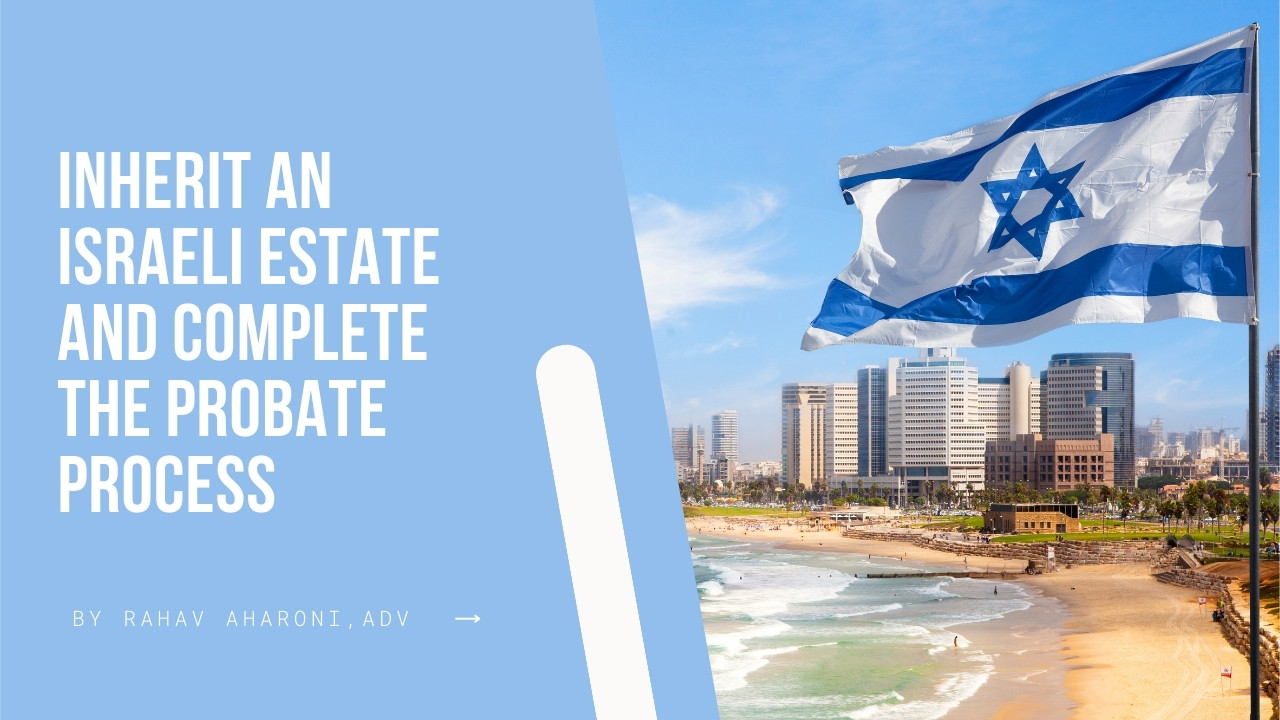A relative of yours has passed away and left an estate in Israel. You may be the only heir or you may be one of several heirs. You will now need to begin the probate process of filing with the Israeli courts to secure your inheritance. So you need to find an Israeli attorney with a proven track record dealing with probate and estate matters in Israel.
Probate law in Israel is governed by the Succession Law of 1965 (‘Succession Law’). The Israeli probate courts, also known as the “Registrar” and “Family Court”, have jurisdiction over the estate of any person who at the time of his or her death was a resident of Israel, or who left property, assets, chattels, or real estate in Israel. The default presumption of the law is stated in Section 1 of the Succession Law, which is that a man’s estate passes on to his heirs upon his death. This includes his fiscal assets, property, real estate, copyrights, etc.
After a person passes away, the fate of their property must be decided. Succession law in Israel is highly complex and requires the guidance of an expert in Israeli inheritance law. We help international heirs to navigate through the highly complex Israeli inheritance process. Depending on the specifics of the case, the entire process can be accomplished quickly, or it can take time. Under Israeli law, the rules of inheritance are subject to the jurisdiction where the decedent (deceased) passed away and/or owned property at the time of his or her death.
Contents
How Assets Are Bequeathed in Israel?
Israeli Probate law stipulates that there are two different ways inherited assets may be bequeathed to heirs: either by will or by law.
If the deceased has left a will, the Israeli estate will be divided among the heir/s as stipulated in the will, unless an objection is submitted to the registrar and from there to court.
If the deceased hasn’t left a will, his/her death is termed “intestate”. At this point, the law becomes significantly more complex and requires a detailed examination by an experienced Israeli attorney to fully understand and distinguish the entitlements that each type of relative/heir receives under Israeli law. Israeli Probate Law provides a stipulated percentage of the estate to a deceased’s heirs according to their relationship with the deceased in a specified order of priority/preference.
Relatives of an individual who died intestate in Israel are entitled to inherit the following percentages of the Israeli estate:
- The deceased’s spouse at the time of death will get 50% of any real estate in the Israeli estate and 100% of all non-real estate assets.
(Note: the surviving spouse is the only relationship mentioned here who isn’t related to the deceased by blood; this may also include a common-law spouse); - The deceased’s offspring, including illegitimate and adopted children and their offspring, will get 50% of any real estate of the Israeli Estate and 0% of non real estate like a bank account, pension fund, chattels, cars, etc.
- The deceased’s parents, grandparents, and their offspring.
Note: Heirs to an Israeli estate are not required to be residents of Israel to claim their inheritance.
In the absence of the aforementioned heirs, the State of Israel inherits the estate and has an obligation by law to keep the funds for a certain number of years. Read this article about the Israeli inheritance tax.
An Israeli Judge May Split Assets
The inheritance will be divided 1/2 to the deceased’s spouse (one part) and 1/2 to the deceased’s children in the case of real estate, the other part to be divided equally among them. These heirs take precedence over the parents of the deceased and their offspring, which in turn take precedence over the grandparents of the deceased.
The spouse will inherit the entire estate only if the deceased has no children, siblings, or parents. Otherwise, the spouse is entitled to half the estate if the deceased is survived by children or parents, and to two-thirds of the estate if the deceased is survived by grandparents, siblings, or other relatives.
As mentioned above, the spouse is also entitled to inherit 100% of the deceased’s movable property, including motor vehicles, which were part of the shared household. According to the Israeli Succession Law, the assets belonging to the surviving spouse are not part of the estate which is to be inherited. These assets may include up to half of the value of the couple’s assets, due to the operation of the Spouses (Property Relations) Law 5733 – 1973, the principles of joint ownership of property, or a property relations agreement (for example, a prenuptial agreement or ‘prenup’).
Petitioning for a Succession Order Under Israeli Inheritance Law
In the case of inheritance in the absence of an Israeli will, the distribution of the Israeli estate to the heirs according to the law will begin with a petition for a succession order. This petition may be handed to the Registrar’s office in Tel Aviv if the deceased was not a resident of Israel. It then is sent to the family court to issue a decree. The succession court order is a valid judicial order. It does not suffer obsolescence and can be enforced years following its issuance.
The probate court order does not specify the details of the distribution of assets among the heirs but only decides upon the identity of the heirs and their respective percentage inheritance rights.
The probate petition must be accompanied by a large number of documents including the following:
- Drafting a probate petition from A to Z including translation.
- Foreign law opinion regarding the Domicile of the deceased.
- A Succession Order petition alongside an affidavit signed by the petitioner, who must be one of the heirs, the estate manager, or a creditor of an heir. The petitioner’s declaration must be verified by an attorney, notary, judge, or head of the local council or your local Israeli consulate.
- An original death certificate. If the deceased passed away outside of Israel an Apostille is required.
- Formal notices to all remaining heirs notifying them of the Succession Order Petition, including the aforementioned heirs’ signatures or confirmation of delivery of the notices by registered mail.
Please contact our firm regarding the exact procedural requirements of the process of requesting an Israeli Succession Order and other subjects including any inheritance aspects that may be applied. Where the petition for the order is made by an attorney on behalf of an interested party, it must be accompanied by an original General Power of Attorney or a copy faithful to the original.
Amending or Annulling an Israeli Succession Order
The Israeli Succession Registrar and the family court may amend a Succession Order (or a Probate Order, which is discussed in a separate article). If the order was granted by a court of law only a court of law may annul or amend it. Any interested party may request to annul a Succession Order; this right is not limited to the heirs of the estate.
One of the most common examples of annulment of a Succession Order is when after the order is given it is found that the deceased had left a will in Israel. In such a case the Succession Order may be annulled and a probate order must be requested in respect of the will.
There is no Estate/Death/Inheritance tax in Israel. Residents of certain countries (eg. the United Kingdom) may be required to pay certain inheritance/estate taxes. Please check with our law firm to determine your exact tax liability if any.
Consulting with an experienced Israeli inheritance lawyer will simplify the process and generate the desired results. We are located in Tel Aviv with offices in New York, Los Angeles, California, and Florida. We invite you to schedule a complimentary consultation with our firm to discuss how we can solve your Israeli estate matters successfully.
We submit and manage probate petitions to the Israeli courts every week and we represent international clients from the United States, Canada, the UK, Europe, and Israel. Please contact us in the US or Canada at 888-923-0022 or in Israel at (972) 3.9055478 or (972) 50.7322688 to schedule a discussion regarding the specifics of your case.



